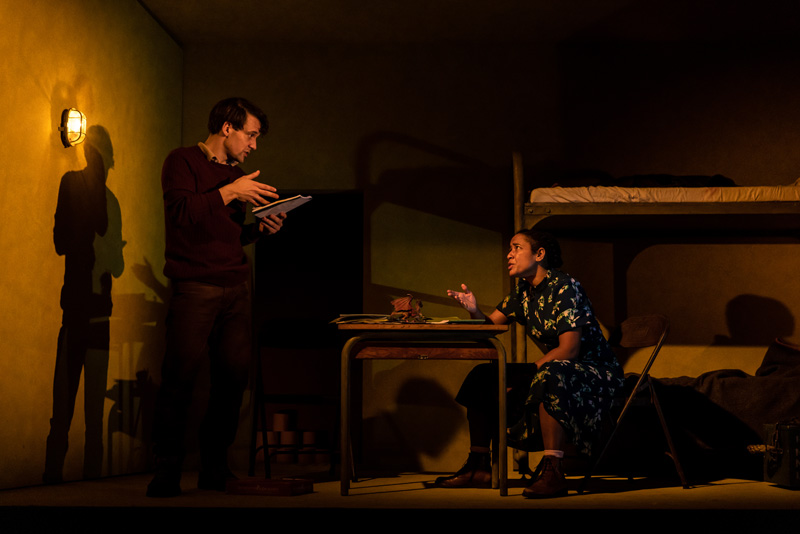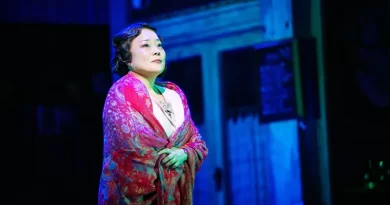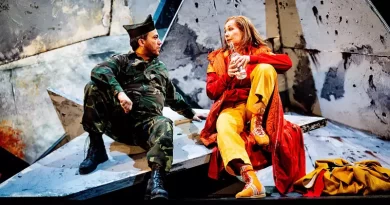“After the End”: Theatre Royal Stratford East
Tom Bolton in London Borough of Newham
11 March 2022
Dennis Kelly’s 2005 play After the End is set inside a nuclear fallout shelter, so it is not surprising that it deals with situations beyond the boundaries of what passes for normality. It has a cast of just two: Mark and Louise, who are colleagues and friends – sort of. Mark has apparently rescued Louise from a nuclear blast. “Terrorists. Probably … Suitcase nuke,” he claims. There is no information on what might have happened to everyone else, although Mark says he saw charred bodies, and there is no signal on the radio. Fortunately, he bought a flat with a fallout shelter under the garden, built in the 1980s – not because of the shelter, although everyone at work laughed at him for it, but … well … lucky he did, isn’t it?

Nick Blood and Amaka Okafor.
Photo credit: The Other Richard.
Kelly builds, with some glee, an atmosphere of intense awkwardness between the two, who find themselves living together in a confined space for the two weeks that, according to Mark, it will take for the radioactive dust outside to settle. It is all too easy to believe that if the apocalypse happened, it would be distressingly ordinary in its mechanics. People would behave in exactly the way we would expect, only more so. Fear and boredom would go in tandem, and a complete lack of any agency would drive everyone insane. Inevitably, we would not get to choose who we faced the future with.
After the End is about the idea of a catastrophe that renders everything else irrelevant, and leaves us with little more than ourselves to fall back on. However, it is also about more than this. For a reviewer the plot is mostly off-limits, as it hinges around a big twist that changes our perceptions of what we are watching. It is safe to say, though, that Kelly is writing about other types of conflict than just nuclear war. We wait in fear for a war that is already taking place, without our noticing. The power that men exercise over women is the territory of daily violence and oppression, and this is what plays out in Mark’s bunker.
Lyndsey Turner’s production is expertly crafted. As tensions rise, Mark and Louise use the confined space differently, spreading to press one another against the concrete walls, and warily covering one another’s sightlines. Designer Peter McKintosh has letter-boxed a shelter space into the Theatre Royal’s proscenium arch, like a section through a subterranean world. It is a thoroughly claustrophobic setting.

Nick Blood and Amaka Okafor.
Photo credit: The Other Richard.
The two performers – Amaka Okafor as Louise and Nick Blood as Mark – are excellent. Blood is entirely convincing in his neediness, very much the creepily socially awkward colleague, resentful of the apparently easy friendships and connections enjoyed by others. Okafor is the opposite – a confident, competent woman under pressure from people who want things from her. The friendship between the two is unhealthy. Mark is obsessed with her, too immature to express himself or relate as an equal. He seems amiable but, as we soon see, is capable of exploiting his power over Louise, and maybe of much more.
Although they are played very well, After the End falls short through these two characters. Mark is too much of a stereotype to be entirely believable: a man whose genuine obsession is having Louise to himself, so they can play Dungeons and Dragons. Louise is defined by her reactions to the situation she finds herself in, and it is not until the play’s final scene that we see a fuller version of her, and understand a little more about who she is and what she wants.
Okafor’s performance is compelling, and her explosion when finally able to do as she chooses is visceral. However, the final note of rapprochement between the two feels odd in light of what has gone before. It is very difficult to have any sympathy for Mark, who emerges as an unpleasant character on every level, from the petty to the fundamental. His behaviour is, from any perspective, unforgivable.
After the End is an intriguing, if not entirely successful play. However, this is a high-quality revival by Turner, and Theatre Royal Stratford East should be commended for programming such challenging work, giving us a chance to look again at the new writing of our recent past.

Nick Blood and Amaka Okafor.
Photo credit: The Other Richard.









